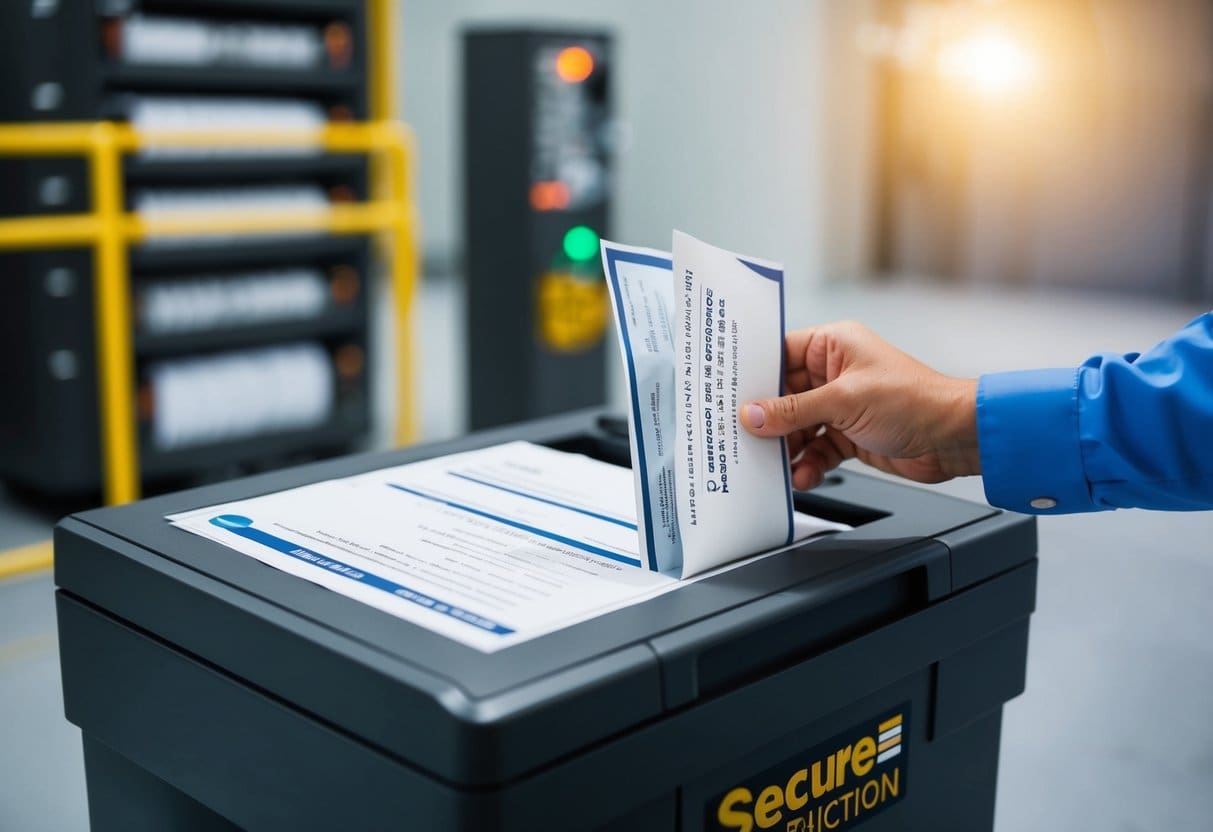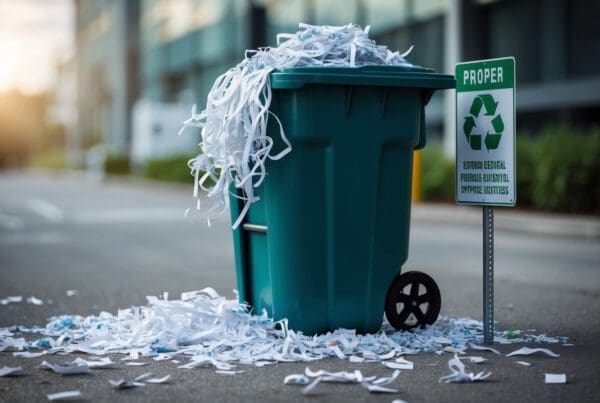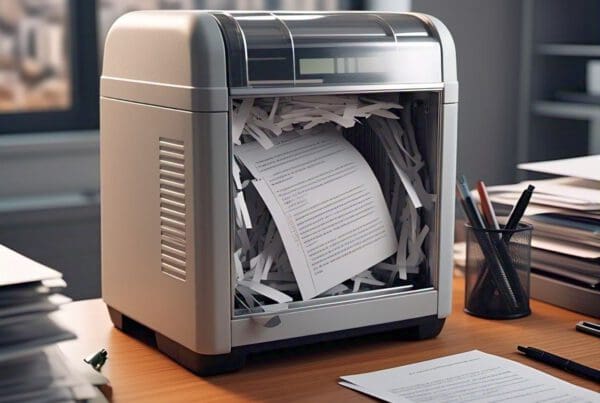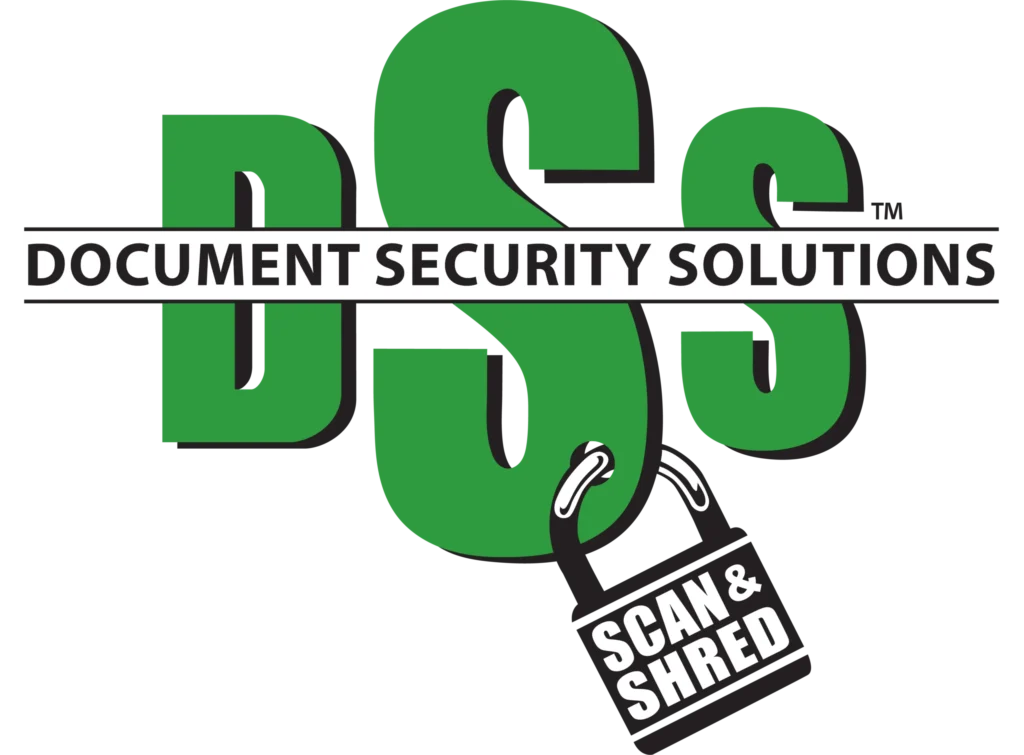Understanding Secure Document Destruction

Secure document destruction is vital for protecting sensitive information. This section discusses why it’s important and looks at different services available for destroying documents safely.
Significance of Secure Document Destruction
Secure document destruction is crucial to prevent unauthorized access to sensitive information. When we dispose of confidential documents improperly, we risk breaches that could harm our reputation and lead to financial loss. Maintaining data security helps build trust with clients and partners. By ensuring that documents and electronic media are destroyed securely, we protect our business from potential threats.
Data protection laws also require us to follow strict guidelines for handling and destroying documents. Failing to comply can result in severe penalties. This highlights the importance of a thorough destruction process, which includes secure document shredding and proper disposal of electronic media.
Types of Document Destruction Services
There are several services designed to handle document destruction safely.
Shredding services are common for hard copy records. They reduce paper documents into small, unreadable pieces, which makes it difficult for anyone to reconstruct the information.
Electronic data destruction involves wiping or physically destroying computer hard drives and other storage devices. This prevents the retrieval of confidential digital information.
Some providers offer on-site destruction, where they bring equipment to our location, while others perform these tasks off-site. Both have their pros and cons, depending on our security needs and volumes of material. It’s important that we choose a service that complies with industry standards and best practices to ensure the security of our confidential documents throughout the destruction process.
Compliance and Industry Certifications
When evaluating secure document destruction providers, compliance with industry standards and regulations is vital. We need to focus on how they uphold laws and certifications like NAID, HIPAA, and FACTA, which are essential for safeguarding sensitive information.
NAID and Its Role in Document Destruction
The National Association for Information Destruction (NAID) sets important standards for data destruction. As members of NAID, organizations can earn NAID AAA Certification. This certification ensures that providers meet industry requirements for secure data disposal.
NAID audits companies to check for compliance with data protection laws and adherence to ethical practices. The thorough audit process gives us confidence that the providers will protect our sensitive data. Organizations rely on NAID for its credibility and stringent standards in data disposal.
Understanding HIPAA and FACTA Regulations
Both HIPAA and FACTA play key roles in the management and destruction of documents. HIPAA applies to healthcare organizations, requiring the protection of medical information through secure disposal. This ensures patient privacy is maintained at all times.
FACTA applies to all businesses that dispose of consumer information. It requires the destruction of sensitive data to prevent identity theft and fraud.
Knowing that a provider complies with these laws means understanding that they are capable of protecting private information. Providing services in line with these regulations is mandatory, ensuring our documents stay confidential and secure.
The Importance of Certificate of Destruction
A Certificate of Destruction is a formal document provided by destruction services, verifying that documents were disposed of securely. It serves as proof that an organization complied with legal requirements for data destruction. Receiving a Certificate of Destruction is vital for our records, offering us peace of mind and protection in case of audits or legal inquiries.
It shows that the provider follows industry practices and complies with relevant laws and regulations. Having this certification highlights a provider’s dedication to security, helping us trust their services with our sensitive documents.
Best Practices and Considerations for Security
We must prioritize both information security and environmental responsibility. Understanding how to choose the right provider for document destruction is crucial. Let’s explore important aspects of secure destruction, responsible practices, and provider selection.
Secure Destruction and Information Governance
Ensuring secure document destruction begins with robust information governance. We must implement strict records management to control access to sensitive data and reduce risks of data breaches and identity theft. Document destruction should include secure paper shredding processes that guarantee effective data removal.
Using trusted shredding service providers ensures that a secure chain of custody is maintained. Our partners in the information destruction industry must have proven experience and certifications for best security practices. Mobile shredding options may provide added assurance, as destruction happens on-site.
Environmental Responsibility in Document Destruction
Secure disposal can be coupled with eco-friendly practices. By choosing providers that prioritize recycling, we ensure that shredded materials are handled responsibly. Using environmentally friendly practices minimizes our carbon footprint while upholding information security.
It’s vital to select partners that integrate green programs into their destruction processes. We should seek providers who demonstrate a strong commitment to environmental responsibility, applying sustainable methods in tandem with secure shredding practices. Our emphasis on eco-consciousness reflects our dedication to global well-being.
Choosing the Right Document Destruction Provider
Choosing the right provider involves reviewing their credentials and practices.
- We must assess their ability to secure sensitive information and prevent breaches.
- Look for providers with a proven track record in the industry, who comply with applicable regulations and certifications.
- We should verify their methods for secure disposal and recycling.
- Providers need to demonstrate reliability and accountability with ongoing audits and performance reviews.
- Transparency in their processes ensures we can trust them with our information security needs.
The choice of provider reflects our commitment to safeguarding sensitive data while being environmentally responsible.





